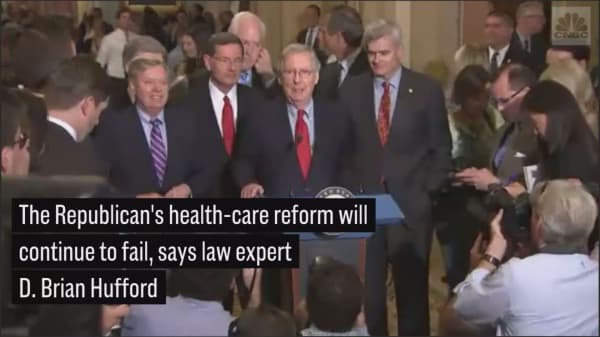Driven by the sting of defeat and determination to deliver on a campaign promise, Republicans have put "repeal and replace" back on the agenda. But even if their new health plan passes, it is ultimately doomed. Like every recent overhaul attempt, including Obamacare, this new effort fails to address the systematic problem at the heart of our health woes: the free-market's fundamental incompatibility with efficient and effective healthcare delivery.
This simple reality is understandably hard to accept, given the innumerable ways in which capitalism empowers consumers. Yet, with health care, the free market has been flipped on its head – rather than giving consumers choice and control, it has given for-profit insurance companies nearly complete ability to dictate pricing, features and availability of coverage.
No group of people understands this better than attorneys, like myself, who have spent decades dissecting insurers' operations. In fighting for doctors and patients, we've seen that the free market is incapable of addressing the inherent conflicts of interest in a for-profit health insurance model, in which all private insurers actively (and, usually, legally) limit their liability and reduce payments.
Their tactics are varied, but often involve the reliance on statistically questionable internal databases to reduce provider reimbursements, application of overly restrictive internal rules to deny coverage for medically necessary services, use of outdated standards to exclude "experimental" treatments that are proven safe and effective, and much more.
Of course, by prioritizing shareholder interests, for-profit insurers are typically acting as capitalism demands – to increase earnings and maximize profits, rather than to address public needs. As a result, they will inevitably exclude, or make highly expensive, coverage for pre-existing conditions or other costly services. That such policies could price-out millions of poor or elderly patients is not only largely irrelevant, but to act otherwise could be at odds with an insurer's fiduciary obligations.
For most products, free market forces efficiently constrain the excesses of capitalism (albeit, aided by government oversight and a vigorous legal system). But three decades of experience makes it impossible to ignore that capitalism – even when bolstered by government "safety net" programs – has failed to serve those who need health insurance the most or to incentivize companies to make affordable and quality insurance universally available.
This failure is caused by a structurally anti-consumer system. According to the Henry J. Kaiser Family Foundation, of all health insurance obtained outside government programs (i.e., Medicare and Medicaid), more than 85 percent comes through employers. As a result, most Americans have their insurance chosen for them by a middleman.
This distortion dramatically limits consumers' ability to use the free market to their advantage. The employer, as the product purchaser, may have the market power to influence insurer conduct, but is motivated to keep business costs low rather than to ensure the best coverage. In contrast, the product's user – a patient – has virtually no influence. While insurers may try to compete on price paid by employers, they have little incentive to improve coverage – and even less incentive to serve those without employee coverage.
Making matters worse, over 60 percent of covered workers are in self-funded plans, in which the employer pays a worker's medical expenses and hires an insurance company to process claims. Even if they value a healthy workforce, these employers naturally want to keep costs low by providing the least expensive coverage possible.
And the free market fails even when consumers have a choice of plans, whether through their employer or the open market. Unlike typical products, health plans are incredibly complicated to understand – even for seasoned lawyers. As a result, consumers are forced to make decisions based simply on price, removing their ability to influence plan features or quality.
Obamacare addressed some of the system's inherent problems. It expanded Medicaid and created more individual plans through exchanges. And it protects consumers by, among other things, ensuring that essential services are covered in employer-provided insurance, prohibiting exclusions for pre-existing conditions and expanding notice and appeal rights for benefit denials. It has certainly put us in a far better position – however, further gains are limited by its reliance on the free market.
So today, we are left with a stark choice. Do nothing – or worse, replace Obamacare with the current GOP proposal – and allow millions to go uninsured or underinsured, accepting this as an inevitable result of capitalism. Or, recognize that delivering quality and consistent healthcare for all – a goal nearly all Americans share – requires a far more significant government role.
How significant? Well, merely guaranteeing "access" to insurance is not enough. We must have an efficient, reliable system for ensuring that, whenever medical care is needed, and regardless of a patient's ability to pay, it is provided. Or more simply: anything we do must pass the so-called 'Jimmy Kimmel Test:'
Tweet
Decades of experience have proven this will never happen through the free market - leading to one rational option: a single payer model.
While opponents have loaded that term with a litany of horrors, it is in fact the approach that has led to the success and popularity of Medicare. Further, a "Medicare for all" system could be supplemented with private options, allowing individuals to pay for additional features if they so choose. This would provide the freedom many believe is essential, while finally achieving the universal coverage that every other civilized nation offers its citizens.
Repeal-and-replace, or any other reform effort, will fail unless leaders in Washington accept the need to revisit-and-remove distortive market forces. When they do, they'll quickly realize that a popular and successful healthcare model is already right in front of them.
Commentary by D. Brian Hufford, a partner at Zuckerman Spaeder LLP. Hufford, who leads a national practice representing patients and providers in disputes with health insurers, is a litigation expert and 20-year veteran in the U.S. health care field.
For more insight from CNBC contributors, follow @CNBCopinion on Twitter.



